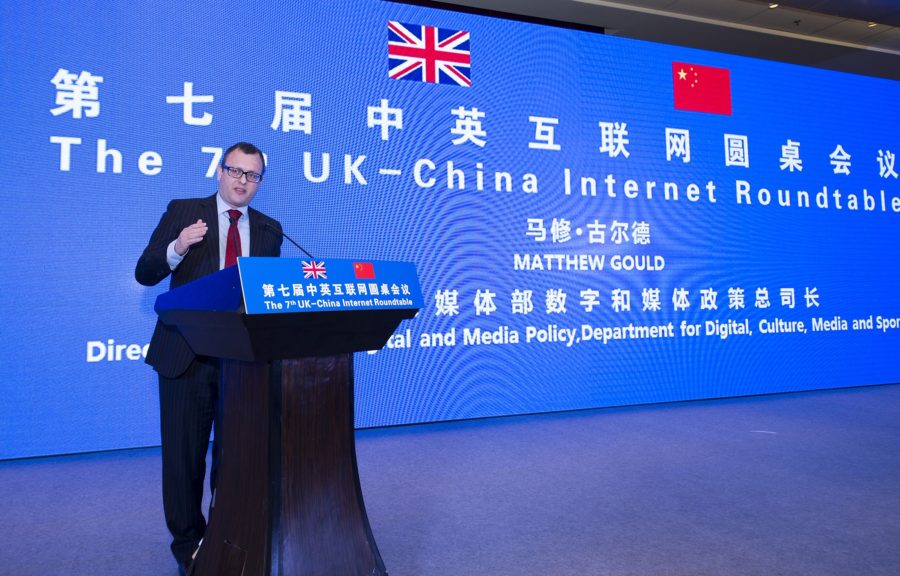16th July 2019 Beijing
London Tech Week: Tech for Good

I remember learning in history classes how the invention of the steam engine brought the world to the industrialisation of modern civilisation. But to think that I am witnessing another historic age where technologies drive the fourth Industrial Revolution.
The fourth IR so far has been about how technologies are changing our lives. If you take the phrase ‘seeing a doctor’ as an example, it might soon not be true literally thanks to artificial intelligence. A hospital in Shanghai uses AI technologies which can provide diagnoses, such as whether a patient has diabetes, hypertension, or any other chronic conditions or diseases, in just two minutes without actually seeing a doctor. I believe that we are in an age where technologies are liberating us from repetitive tasks and even making non-complex decisions for us. But when humans and machines combine in the workplace, we need to ask ourselves: do we have trust in technology? Is it ethical? Is it used for the good of the world?
Just two weeks ago I was lucky enough to attend the London Tech Week – a tech festival that celebrates innovation and creativity in technology, as well as how it impacts society. From CogX in King’s Cross to the AI Summit at Excel – AI was the technology everyone wanted to hear about.
Going to the Tech Week with a China perspective I noticed a lot of Chinese elements. Every talk I went to at CogX mentioned China’s rapid progress in the research and applications of AI. In 2017, China declared its plans to become the world leader in artificial intelligence (AI) by 2030, with an industry worth CNY1 trillion (GBP112bn). The UK has also announced AI and Data as one of the four Grand Challenges under the Industrial Strategy. With both countries focusing on AI development, the ethical use of AI has become ever more critical.
Artificial Intelligence is a term created to differentiate from human intelligence. But the key thing to notice is that it is still humans that are writing the codes for AI algorithms. If we cannot ensure equality, diversity and inclusion are fitted within these codes then how can we trust that they will deliver ethical AI? When a self-driving car gets into an accident, is it the car or the person who programmed the car that should be responsible? Of course there are deeper questions but these show how important it is to develop AI responsibly to ensure it is used for social good.
During the Tech week, Microsoft UK’s Director of Azure Business, Michael Wignall, stressed that ‘the performance of AI has reached human parity in vision, speech and language tests, and it’s only going to get smarter in the future. What developers of AI should be asking themselves is not just ‘can we do this?’ but ‘should we do this?’
The Science and Innovation Network has been exploring opportunities to work with China on the subject of ‘Tech for Good’. Earlier this year in April, SIN supported the 7th UK-China Internet Roundtable held in Beijing. It was a hugely successful event with an outcome paper signed by both sides which touched on Data and AI. Both sides agreed to enhance discussions to understand the impact that new technologies including AI and big data will bring.

China has been increasingly focused on AI ethics and standards. Following the publication of various sets of national and multi-lateral AI principles (such as the International Panel on Artificial Intelligence announced in Dec 2018 at the G7) the Beijing Academy of Artificial Intelligence (BAAI) published the ‘Beijing AI Principles’ on 25 May 2019. The Beijing Principles were created in consultation with the leading domestic players (Peking and Tsinghua Universities, the Institute of Automation and Institute of Computing Technology) as well as China’s tech giants – Baidu, Alibaba, and Tencent.
The Beijing Principles are closely aligned with those published by the UK and the EU, recognising the need for a regulatory environment to ensure the use of AI for social good. It also shows that China is keen to engage internationally on these issues as the development of AI concerns the future of all humankind, and goes beyond national boundaries. However, as the two countries operate on different standards systems SIN is working on identifying areas which will address a common challenge faced by both countries and one where we are well-positioned to help shape China’s approach.